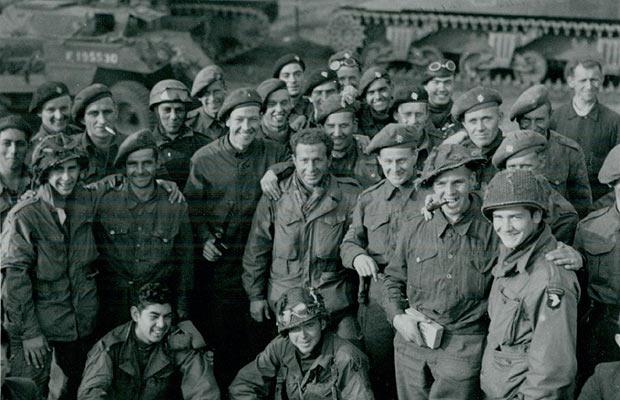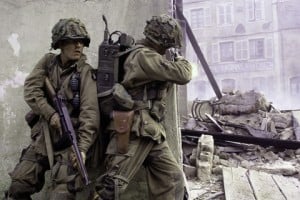 There’s an interesting post over at the Blog of Manly titled, “Is Your Band of Brothers Not Working?” The author, a cigar-puffer named Josh, says that the church is approaching men backwards:
There’s an interesting post over at the Blog of Manly titled, “Is Your Band of Brothers Not Working?” The author, a cigar-puffer named Josh, says that the church is approaching men backwards:
The dominant assumption is that you can stick a dozen guys in a room, feed them, and – BOOM – camaraderie. Then, with camaraderie in place, they can survive whatever battles (in reality, there aren’t any – we’ll come back to this) they find themselves in. But this is a facade. It’s not the real thing. You can’t expect proximity and a few shared core beliefs to solidify a group of men into a fighting force. It doesn’t work that way.
 So what’s the right way to approach men? Josh cites the deep camaraderie men experience on the battlefield, particularly as portrayed on the HBO TV series “Band of Brothers.” Bonds form when men share foxholes, he writes. And he chastises the church for failing to fight:
So what’s the right way to approach men? Josh cites the deep camaraderie men experience on the battlefield, particularly as portrayed on the HBO TV series “Band of Brothers.” Bonds form when men share foxholes, he writes. And he chastises the church for failing to fight:
The church doesn’t know much about war. We pay lip service to it. We tell the masses of bored, neutered, nice guys to put on the armor of God, watch Braveheart, come to the weekly Band of Brothers pancake breakfast, but we don’t know much about war. We couch our daily responsibilities as “battlegrounds” but we don’t really believe it.
Until the church is willing to pick a fight – until the men in the church have that lifetime cause that drives them to stare defiantly down the barrels of the enemies’ weapons – don’t waste your time with a Band of Brothers. It’s just a fancy new name for the same, rehashed waste of time we’ve seen for a generation.
Josh’s blog raises two fundamental questions about Christianity I’ve never wrestled with:
Fundamental Question #1: Should the church focus men on a new, shared battle, or should the church primarily help men fight the personal battles they already face?
Put another way: is Christianity’s main purpose to say, “Here’s a battle — go fight it,” or is it to say, “Here is support for the battle you’re already fighting.”
 For decades, mainline and Catholic churches have focused primarily on the former. Most mainline congregations emphasize good works – helping the poor, feeding the hungry, etc. They give their members a new, external battle to fight – while leaving their members’ inner lives alone.
For decades, mainline and Catholic churches have focused primarily on the former. Most mainline congregations emphasize good works – helping the poor, feeding the hungry, etc. They give their members a new, external battle to fight – while leaving their members’ inner lives alone.
Meanwhile, Evangelical churches have tended to focus on the inner battle – the struggle for personal holiness and life transformation. To a much greater degree, Evangelicals focus on men’s existing battlegrounds: marriage, temptation and overcoming sin. Evangelicals have been criticized for placing little emphasis on external battles and mission.
So you’d think that the Mainline and Catholic churches would be brimming with men, since they’re the ones out “picking fights” as Josh prescribes. Yet most Mainline congregations do a poor job engaging their men – particularly younger ones. Meanwhile, Evangelical churches, which tend to be more inward focused, are much more successful at engaging guys.
Neither model is very good at creating deep camaraderie among men.
Let’s ask the same question about men’s ministry: should men’s ministry A) go out and “pick fights” that men can participate in together, or B) teach men to win the fights they find themselves in on a daily basis?
These days most men’s ministry focuses on B). The majority of men’s curricula are designed to help guys overcome their private battles with lust, anger, broken relationships, selfishness, pride, materialism, etc. The premise of modern men’s ministry is that a successful Christian life depends on men winning their existing, personal battles.
But the weakness of this approach is that it’s personal. Giving a man the tools to fight his daily individual war does not create camaraderie – in fact, it seems to discourage the formation of brotherhood, unless there’s a strong emphasis on sharing, truth-telling and mutual accountability.
So how do we create camaraderie among men? Josh is correct in that men don’t bond over shared books or shared beliefs – they bond over shared experiences, especially pressure-packed experiences where the outcome is uncertain. Brotherhood forms on battlefields, on sports teams, on long hunts, even in fraternities. The pressures of war, competition, survival and academics can forge strong heart-links among men.
These bonds take time to form. The men of Easy Company lived and fought together for years. Athletes practice and play together for months. Hunters go into the field for a week or more. A weekly, 90-minute Bible study or a pancake breakfast cannot provide the same environment.
And don’t miss this: men bond when they are out of control of their situations. Easy Company could not control the bullets whizzing overhead. Sports teams cannot control the outcome of the game (or the decisions of the coach). Hunters cannot control the actions of their prey.
 Jesus constantly put his men out of control. He intentionally startled and even frightened them in order to bond them into a fighting force.
Jesus constantly put his men out of control. He intentionally startled and even frightened them in order to bond them into a fighting force.
The best way to get men out-of-control with Jesus is the short-term mission trip – but the high cost is a barrier for many guys. And the brotherhood that forms overseas can quickly fade when men return home.
The LDS church comes the closest to having this figured out. Mormons offer a two-year mission to every young man in the church. This crucible binds LDS men to their church and to one another. Is it any coincidence Mormonism is the fastest growing religion in the USA?
Simply sending men out to do good works is inadequate – and impractical. Most men are tired and busy. They don’t have time or energy for another battle. Suggesting they go out and pick a fight by “street witnessing” or serving at a soup kitchen is a non-starter for most guys – unless they’re retired.
So here’s fundamental question #2:
How can we create men’s ministry curricula that help men with the battles they already face, while simultaneously creating the pressure and out-of-control dynamic that creates camaraderie?
Well, if I were building a men’s ministry from the ground up, I’d structure it as a two-tiered program:
- An all-comers general session, focused on men’s inner battles.
- An elite, Delta Force experience for the highly committed men. Demanding and rigorous. Take men through a series of out-of-control experiences that teach a spiritual truth.
So what do you think? What is the purpose of Christianity – to focus men on new battles, or to help men win the battles they already face? Yes, yes, I know, it’s both. But which is of primary importance? Where do we start? How can these two emphases be combined? If I were the men’s ministry leader in your church, would you join my Delta Force? Leave your comments below, or join the conversation on my Facebook page.
P.S. My friend Herb Reese has a men’s program that combines the internal and external battles into one monthly meeting. Check it out by clicking here.
















